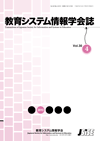30 巻, 1 号
選択された号の論文の18件中1~18を表示しています
- |<
- <
- 1
- >
- >|
巻頭言
-
2013 年30 巻1 号 p. 1-3
発行日: 2013/01/01
公開日: 2018/04/27
PDF形式でダウンロード (256K)
功績賞・功労賞
-
2013 年30 巻1 号 p. 4
発行日: 2013/01/01
公開日: 2018/04/27
PDF形式でダウンロード (298K)
2012 年度 論文賞
-
2013 年30 巻1 号 p. 5
発行日: 2013/01/01
公開日: 2018/04/27
PDF形式でダウンロード (107K)
特集:「ICT の高度化による先進的学習支援に向けて―技術と人間の共生を目指して―」
発刊のことば
-
2013 年30 巻1 号 p. 6-7
発行日: 2013/01/01
公開日: 2018/04/27
PDF形式でダウンロード (222K)
解 説
-
2013 年30 巻1 号 p. 8-19
発行日: 2013/01/01
公開日: 2018/04/27
PDF形式でダウンロード (1347K)
原著論文
-
2013 年30 巻1 号 p. 20-31
発行日: 2013/01/01
公開日: 2018/04/27
PDF形式でダウンロード (1190K) -
2013 年30 巻1 号 p. 32-41
発行日: 2013/01/01
公開日: 2018/04/27
PDF形式でダウンロード (1089K) -
2013 年30 巻1 号 p. 42-53
発行日: 2013/01/01
公開日: 2018/04/27
PDF形式でダウンロード (863K) -
2013 年30 巻1 号 p. 54-64
発行日: 2013/01/01
公開日: 2018/04/27
PDF形式でダウンロード (1201K) -
2013 年30 巻1 号 p. 65-76
発行日: 2013/01/01
公開日: 2018/04/27
PDF形式でダウンロード (758K)
実践論文
-
2013 年30 巻1 号 p. 77-91
発行日: 2013/01/01
公開日: 2018/04/27
PDF形式でダウンロード (1170K)
ショートノート
-
2013 年30 巻1 号 p. 92-97
発行日: 2013/01/01
公開日: 2018/04/27
PDF形式でダウンロード (808K) -
2013 年30 巻1 号 p. 98-103
発行日: 2013/01/01
公開日: 2018/04/27
PDF形式でダウンロード (470K) -
2013 年30 巻1 号 p. 104-109
発行日: 2013/01/01
公開日: 2018/04/27
PDF形式でダウンロード (457K) -
2013 年30 巻1 号 p. 110-115
発行日: 2013/01/01
公開日: 2018/04/27
PDF形式でダウンロード (1368K) -
2013 年30 巻1 号 p. 116-121
発行日: 2013/01/01
公開日: 2018/04/27
PDF形式でダウンロード (499K) -
2013 年30 巻1 号 p. 122-127
発行日: 2013/01/01
公開日: 2018/04/27
PDF形式でダウンロード (690K)
コミュニティ・プラザ
-
2013 年30 巻1 号 p. 128-134
発行日: 2013/01/01
公開日: 2018/04/27
PDF形式でダウンロード (1246K)
- |<
- <
- 1
- >
- >|
